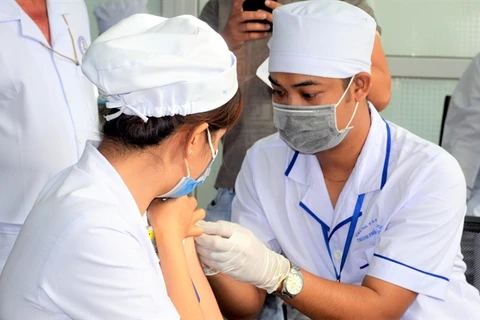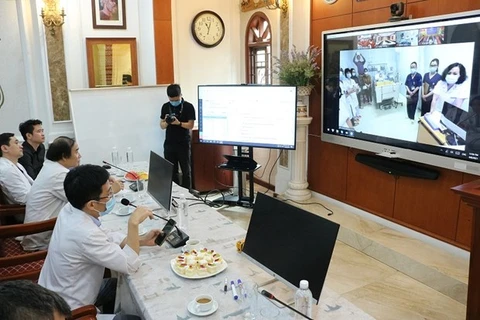Hanoi (VNA) – Over the past week, Vietnam detected a number of COVID-19 cases as a result of the lax monitoring over quarantine at concentrated facilities as well as residences.
Such cases have led to pandemic clusters in different localities such as Hanoi, Da Nang, Vinh Phuc, Ho Chi Minh City, Hai Duong, Hung Yen and Da Nang, triggering public concern.
The latest cluster with 61 cases was found at the Kim Chung facility of the National Hospital for Tropical Diseases in Hanoi’s outlying district of Dong Anh.
Rapid, complex developments of COVID-19
After many days without new locally-transmitted infections, the pandemic has resurged in localities like Hanoi (20 cases), Vinh Phuc (25), Yen Bai (5), and the National Hospital for Tropical Diseases No. 2 in Hanoi’s Dong Anh district (61).
The new infections have swept away achievements and efforts by the country over the past time. Notably, the National Steering Committee for COVID-19 Prevention and Control forecast that the pandemic would develop more complicatedly in the time ahead.
The committee pointed out limitations at concentrated quarantine establishments which have yet to fully observe regulations and guidelines issued by the Ministry of Health.
Moreover, the monitoring over home quarantine in localities has also shown shortcomings, the committee said.
Those under the 14-day home quarantine must avoid public gatherings, follow the health ministry’s 5K message - khau trang (face masks), khu khuan (disinfection), khoang cach (distancing), khong tu tap (no gatherings), and khai bao y te (health declarations), and other pandemic prevention and control measures.
“Loopholes” in quarantine monitoring in localities
As from April 27, there have been relapse cases found among people who returned home after completing their quarantine and tested negative for the coronavirus twice or thrice.
One of them is Patient 2899, who came back home from Japan on April 7 and completed his quarantine on April 22.
However, after returning to his hometown in the northern province of Ha Nam, the man tested positive for the virus again on April 24. During his home quarantine, he joined a wedding party and other gatherings.
Authorities found 20 cases linked with Patient 2899, including 14 in Ha Nam, three in Hanoi, two in Hung Yen and one in Ho Chi Minh City.
Given this, Ha Nam punished organisations and individuals violating pandemic prevention and control measures.
Lax monitoring at quarantine establishments
Meanwhile, the lax medical monitoring is a reason behind the spread of COVID-19 at a quarantine facility in the northern province of Yen Bai.
 Nhu Nguyet 2 Hotel in Yen Bai city where Indian experts and their relatives were under quarantine in April. (Photo: VNA)
Nhu Nguyet 2 Hotel in Yen Bai city where Indian experts and their relatives were under quarantine in April. (Photo: VNA) On April 17, four COVID-19 cases were found among a delegation of 11 Indian experts who had been quarantined at Nhu Nguyet Hotel in Yen Bai city. At the same time, one out of Chinese experts quarantined at the hotel also tested positive for the coronavirus.
The health ministry said the source of the infections would come from the Indian experts.
Other infections associated with the Chinese patient were then registered in Hanoi and Vinh Phuc in April.
 The health ministry’s delegation inspects quarantine work at Nhu Nguyet Hotel in Yen Bai province. (Photo: VNA)
The health ministry’s delegation inspects quarantine work at Nhu Nguyet Hotel in Yen Bai province. (Photo: VNA) Cross infections in hospitals
The COVID-19 pandemic has also ravaged the National Hospital for Tropical Diseases No. 2 in Hanoi’s Dong Anh district, which had treated COVID-19 patients, especially those in critical conditions.
Earlier, cross infections were also found at the Bach Mai Hospital in Hanoi in March and the Da Nang Hospital in July 2020.
Up to 38 COVID-19 cases have been recorded at the National Hospital for Tropical Diseases No. 2in Dong Anh district, and 23 related cases were detected in the 15 cities and provinces of Ha Noi, Vinh Phuc, Thai Binh, Bac Ninh, Hai Duong, Hung Yen, Lang Son, Yen Bai, Hoa Binh, Phu Tho, Son La, Nam Dinh, Bac Giang, Quang Ninh and Hai Phong.
Shortcomings in health declaration
Health declaration plays a significant role in tracing COVID-19 cases. However, there remain limitations in the work, which come from both the public and competent authorities.
One example is Patient 3092, who stayed in the same place with two Chinese experts while travelling to central Da Nang city in April. However, the Vietnamese man was not quarantined after returning home as he skipped health declaration at the hotel.
Many air carriers have also not seriously observed health declaration regulations as COVID-19 cases have been then found on flights.
Filling “loopholes”
Health Minister Nguyen Thanh Long said the Government and the Prime Minister have looked into weaknesses and loopholes in management during the pandemic fight.
After analysing reasons behind the cases who have completed quarantine, the health ministry decided to extend the quarantine period from 14 days to 21 days, the official said.
 Chemical soldiers disinfect National Hospital for the Tropical Diseases No.2 in Hanoi’s Dong Anh district. (Photo: VNA)
Chemical soldiers disinfect National Hospital for the Tropical Diseases No.2 in Hanoi’s Dong Anh district. (Photo: VNA) He pointed out issues regarding quarantine at hospitals and the transfer of people who completed quarantine to localities, saying the ministry has instructed localities in this regard.
The ministry has also increased testing during quarantine to prevention infections, Long added.
Hospitals are at the high risk of infections, he said, asking them to conduct screen tests for medical workers and other high-risk groups, while implementing pandemic prevention and control measures./.

























